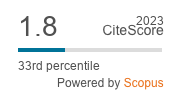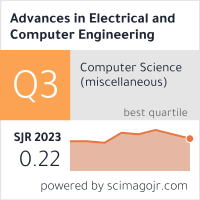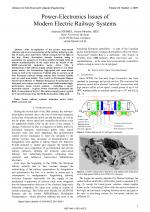| 2/2010 - 1 | View TOC | « Previous Article | Next Article » |
Power-Electronics Issues of Modern Electric Railway SystemsSTEIMEL, A. |
| View the paper record and citations in |
| Click to see author's profile in |
| Download PDF |
Author keywords
railway systems, induction motor drive, IGBT-converter-fed
References keywords
power(18), elektrische(13), control(12), bahnen(12), traction(11), electronics(11), steimel(6), speed(5), hoffmann(5), system(4)
Blue keywords are present in both the references section and the paper title.
About this article
Date of Publication: 2010-05-31
Volume 10, Issue 2, Year 2010, On page(s): 3 - 10
ISSN: 1582-7445, e-ISSN: 1844-7600
Digital Object Identifier: 10.4316/AECE.2010.02001
Web of Science Accession Number: 000280312600001
SCOPUS ID: 77954635700
Abstract
After de-regulation of the former state-owned railways and severe restructuring of the railway industry in the last 15 years, more innovative vehicle concepts saw the light of the day. Power electronics, already formerly being a pacemaker for progress of traction vehicles, brought forth an utmost standardization of the main drive by means of the IGBT-converter-fed induction motor drive. This is independent of the railway supply voltage system or of a diesel prime mover, for locomotives, high-speed and mass-transit trains as well as for tramways. Vehicles able to operate on all four European railway voltage systems have become feasible and are used now widely. New trends as Permanent-Magnet Synchronous Motors or Medium-Frequency Transformers are discussed, and a short overlook over actual field-oriented high-performance motor control systems - including a speed-sensorless variant - is given. Power electronics dominates the field of conversion of the 16.7-Hz railway supply power, typical for Central Europe, from the 50-Hz three-phase utility grid. |
| References | | | Cited By «-- Click to see who has cited this paper |
| [1] Steimel, A., Electric Traction: Motion Power and Energy Supply Oldenbourg-Verlag Munchen, 2008
[2] Schurig, J., Die Mehrsystem-Lokomotive ES 64 U4 (OBB-Reihe 1216). Eisenbahn-Revue 5/2005, pp. 220-228, 6/2005, pp. 268-274 and 7/2005, pp. 333-335. [3] Kehrmann, H., Lienau, W., Nill, R., "Vierquadrantensteller - eine netzfreundliche Einspeisung fur Triebfahrzeuge mit Drehstromantrieb", Elektrische Bahnen 45 (1974), Nr. 6, pp. 135-142 [4] Moller, D., Schlegel, C., Velaro, "Further Development of the ICE for Worldwide Use," Elektrische Bahnen 104 (2006), Nr. 5, pp. 258-263. [5] *** , Alstom prasentiert den Hochgeschwindigkeits-Triebwagenzug AGV. Eisenbahn-Revue 3/2008, S. 117-124 [6] Kurz, H., Weschta, A. (editors), ICE T, BR 411, 415 und 605. Hestra-Verlag Darmstadt, 2000 [7] *** , Funf Jahre OPNV-Niederflur-Schienenfahrzeuge. Stadtverkehr - Fachzeitschrift fur den offentlichen Personen-Nahverkehr, spezial 1993. EK-Verlag Freiburg, 1993. [8] H. Gladigau, A., "Historische Entwicklung und Stand der Bahnstromsysteme," Elektrische Bahnen 85 (1987), Nr. 12, pp. 383-390 [9] Coget, G., "The new generation of SNCF high-speed rolling stock," The TGV-Atlantique train. Rail Engineering Intern. 1986, Nr 3, pp. 15-18 [10] 120 - Elektrische Lokomotive in Drehstromtechnik der Deutschen Bundesbahn," Special print of journal "Elektrische Bahnen". R. Oldenbourg Verlag GmbH, Munich, 1984. [11] Lienau, W., Runge, W., Development Trends of High Power Traction Converters," 4th Europ. Conf. on Power Electronics, Florence 1991 [12] Bakran, M. M., Eckel, H.-G., "Traction Converter with 6.5kV IGBT modules," 9th Europ. Conf. on Power Electronics, Graz 2001. [13] Gerster, C., Skarpetowski, G., Sommer, H., Still, L., "Advanced multi-system traction chain for locomotives and power heads," 10th Conf. on Power Electronic and Motion Control (EPE-PEMC), Riga 2004 [14] Buscher, M., Kock, F., Trotsch, P., Bikle, U., Traxx, "Integrale Plattform zur Steigerung der Wettbewerbsfahigkeit des Schienenverkehrs," ETR - Eisenbahntechnische Rundschau 9/2006 [15] Steiner, M., Scholten, J., "Energy Storage onboard of railway vehicles," 11th Europ. Conf. on Power Electronics, Dresden 2005 [16] Binder, A., Greubel, K., Piepenbreier, B., Tolle, H.-J., "Permanent-Magnet Synchronous Drive with Wide Field-Weakening Range," ETEP Vol. 8 (1998), No. 3, S. 157-166 [17] Jockel, A., "Getriebelose Drehstromantriebe fur Schienenfahrzeuge," Elektrische Bahnen 101 (2003), H. 3, S. 113-119 [18] Jockel, A., Lowenstein, L., Teichmann, M., Hoffmann, Th., v. Wangelin, F., "Syntegra - Innovativer Prototyp einer nachsten Triebfahr-werk-Generation," Elektrische Bahnen 104 (2006), Nr. 8/9, pp. 360-369 [19] Engel, B., Victor, M., Bachmann, G., Falk, A., "15 kV/16.7 Hz Energy Supply System with Medium Frequency Transformer and 6.5 kV IGBTs in Resonant Operation," 10th Europ. Conf. on Power Electronics (EPE), Toulouse 2003 [20] Steimel, A., "Control of the induction machine in traction," Elektrische Bahnen 96 (1998), Nr. 12, pp. 361-369 [21] Blaschke, F., "The principle of field orientation as applied to the new TRANSVECTOR closed-loop control system for rotating machines," Siemens Review (1972), S. 217-226 [22] Gedeon, G., Klausecker, K., Lang, W., "Mikrocomputer-Ansteuerung fur ICE," Elektrische Bahnen 86 (1988), Nr. 7, pp. 229-235 [23] Depenbrock, M., "Direct Self-Control (DSC) of Inverter-Fed Induction Machine," IEEE Trans. on Power Electronics, vol. 4, pp. 420-429, 1988 [CrossRef] [SCOPUS Times Cited 1593] [24] Janecke, M., Kremer, R., Steuerwald, G., "Direct Self Control (DSC), A Novel Method Of Controlling Asynchronous Machines in Traction Applications," Elektrische Bahnen 88 (1990), No. 3, pp. 81-87 [25] Worner, K., Steimel, A., Hoffmann, F., "Highly Dynamic Stator Flux Track Length Control for High Power IGBT Inverter Traction Drives," 8th Europ. Conf. on Power Electronics and Applications (EPE), Lausanne 1999. [26] Steimel, A., "Direct Self Control and Synchronous Pulse Techniques for High-Power Traction Inverters in Comparison," IEEE Transactions on Industrial Electronics, Vol. 51 (2004), No. 4, pp. 810-820 [CrossRef] [Web of Science Times Cited 44] [SCOPUS Times Cited 63] [27] Janecke, M., Hoffmann, F., "Fast Torque Control of an IGBT-Inverter-Fed Three-Phase A.C. Drive in the Whole Speed Range - Experimental Results," 6th Europ. Conf. on Power Electronics, Sevilla 1995, Vol. 3, pp. 399-404 [28] Depenbrock, M., Foerth, Ch., Hoffmann, F., Koch, S., Steimel, A., Weidauer, M., "Speed-sensorless stator-flux-oriented control of induction motor drives in traction," Communications - Scientific Letters of the University of Zilina 2-3/2001, pp. 68-75 [29] Amler, G., Sperr, F., Hoffmann, F., "Highly dynamic and speed sensorless control of traction drives," 10th Europ. Conf. on Power Electronics (EPE), Toulouse 2003 [30] Weidauer, M., Foerth, C., "Robust speed-sensorless control of induction motors in traction applications," (in German). Intern. ETG-Congress, Karlsruhe 2007, ETG-Fachbericht 107, pp. 431-440 [31] Thoma, M., Jampen, U., "Statische Frequenzumrichteranlage Wimmis (Schweiz)," Elektrische Bahnen 104 (2006), H. 12, S. 576-581 [32] Dicks, H., Janning, J., "Standardumrichter Typ BAUM für DB Energie," Elektrische Bahnen 98 (2000), H. 10, S. 364-373 [33] Wrede, H., Umbricht, U., "Development of a 413 MW railway power supply converter." 35th Ann. Conf. of IEEE Industrial Electronics Society (IECON '09), Porto 09 [CrossRef] [Web of Science Times Cited 1] [SCOPUS Times Cited 10] [34] Lesnicar, A., Marquardt, R., "A new modular voltage source inverter topology," 10th European Power Electronic Conf. (EPE), Toulouse 2003 [35] Menth, St., Meyer, M., "Low-frequency power oscillations in electric railway systems," Elektrische Bahnen 104 (2006), H. 5, S. 216-221 [36] Heising, C., Oettmeier, M., Danielsen, St., Staudt, V. and Steimel, A., "Improvement of low-frequency railway power system stability using an advanced multivariable control concept," 35th Ann. Conf. of the IEEE Industrial Electronics Society (IECON'09), Porto 2009, pp. 565-570 [CrossRef] [Web of Science Times Cited 5] [SCOPUS Times Cited 44] Web of Science® Citations for all references: 50 TCR SCOPUS® Citations for all references: 1,710 TCR Web of Science® Average Citations per reference: 1 ACR SCOPUS® Average Citations per reference: 48 ACR TCR = Total Citations for References / ACR = Average Citations per Reference We introduced in 2010 - for the first time in scientific publishing, the term "References Weight", as a quantitative indication of the quality ... Read more Citations for references updated on 2024-10-17 03:30 in 33 seconds. Note1: Web of Science® is a registered trademark of Clarivate Analytics. Note2: SCOPUS® is a registered trademark of Elsevier B.V. Disclaimer: All queries to the respective databases were made by using the DOI record of every reference (where available). Due to technical problems beyond our control, the information is not always accurate. Please use the CrossRef link to visit the respective publisher site. |
Faculty of Electrical Engineering and Computer Science
Stefan cel Mare University of Suceava, Romania
All rights reserved: Advances in Electrical and Computer Engineering is a registered trademark of the Stefan cel Mare University of Suceava. No part of this publication may be reproduced, stored in a retrieval system, photocopied, recorded or archived, without the written permission from the Editor. When authors submit their papers for publication, they agree that the copyright for their article be transferred to the Faculty of Electrical Engineering and Computer Science, Stefan cel Mare University of Suceava, Romania, if and only if the articles are accepted for publication. The copyright covers the exclusive rights to reproduce and distribute the article, including reprints and translations.
Permission for other use: The copyright owner's consent does not extend to copying for general distribution, for promotion, for creating new works, or for resale. Specific written permission must be obtained from the Editor for such copying. Direct linking to files hosted on this website is strictly prohibited.
Disclaimer: Whilst every effort is made by the publishers and editorial board to see that no inaccurate or misleading data, opinions or statements appear in this journal, they wish to make it clear that all information and opinions formulated in the articles, as well as linguistic accuracy, are the sole responsibility of the author.





